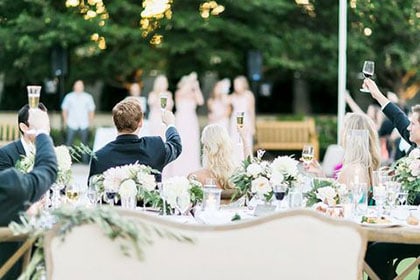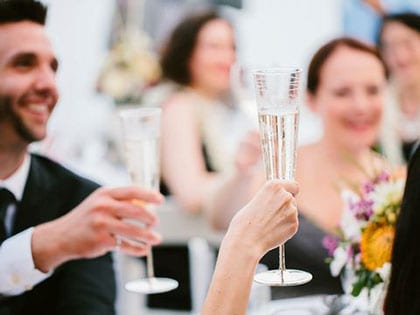
Jan 22
Prepare Funny Toasts and Speeches on the Wedding – Useful Tips
Toasts at Your Wedding: Find a Good Toastmasters for the Celebration
A good toastmaster will coordinate the event on the day, advise on etiquette, organize your guests and liaise with all the suppliers, thus relieving you of most of the stress of being the host. They can also help in the planning stages since many will have suppliers they have worked with before in the local area. A toastmaster can be particularly useful if you are not holding your ceremony in a hotel (where a wedding coordinator would usually be on hand) – for example, if you are having the ceremony at a registry office and going straight on to a reception venue. While you are tying the knot, the toastmaster will arrive at the venue and liaise with the caterers, florists and photographers and make sure everything is going according to plan.
Toasts at Your Wedding: Toastmaster’s Obligations
When you arrive, they will open the door of your vehicle, escort you into the venue and then arrange a line-up to greet guests. This usually consists of parents, the happy couple and sometimes the best men and women. If you want, they can also announce the names of guests arriving. You should also expect them to liaise with the photographer, make sure the cake has been delivered and is ready to cut, check the decorations, and liaise with the band or musicians – basically sorting out any problems on the day.
A toastmaster will also be the go-between to ensure that the caterers are ready to serve dinner and announce this to guests. They will say grace if you want that, or introduce any member of the clergy attending to perform this task. They will also make announcements – for example, asking people to write in a guest book or use disposable cameras.
After dinner, a toastmaster will act as a compere and introduce speakers, check that the band is ready and announce the first dance. Most toastmasters see this as their final duty. You should give the toastmaster timing information, who was to propose the toast, the type of meal everyone will have, names of parents and attendants and if they are presenting them with gifts or presents.
Toasts at Your Wedding: Top tips for the Toastmasters
• Give your toastmaster a full running order for the day, including the mobile phone numbers of suppliers.
• Make sure they have some refreshments.
• Give them at least one person to liaise with among your guests, such as a best man or woman, in case they have questions.
• Most toastmasters will not attend the ceremony, but will focus on the reception.
Speeches at Your Wedding Celebration
The speeches and toasts can be either the highlight or the low point of a wedding reception, depending on the participants. The purposes of the speeches are twofold; first to congratulate the couple and wish them well in their future life together, and secondly to say thank you to appropriate people. Many people quake when they know that they are going to have to make a speech at a wedding, but if you familiarise yourself with what you want to say and stick to a few basic guidelines you should be fine. If you are really stumped, there are agencies that will write a speech for you or provide you with a selection of jokes, anecdotes or quotations.
Usually three speeches are given – by the giver-away of the bride, the bridegroom and the best man – and these include the toasts. Although there is no need for the bride to make a speech, she may wish to say a few words. In which case, she would probably speak after the groom. The speeches are traditionally announced by the toastmaster, Master of Ceremonies or the best man.
Wedding Speech Preparation
There is no substitute for careful planning and preparation. Decide on the length of the speech and then break it up into small sections, by noting all the points to be covered and allocating the time accordingly. By prioritizing and ordering the points logically, a framework will easily be developed. Consider the use of props to add variety and humour. The best method to Practice and deliver a speech is by writing the key points on cue cards. A separate word should be written boldly and highlighted on a plain card, perhaps with a few memory-joggers. Each of the cards should be numbered.
Wedding Speech Presentation
To ensure success three main areas should be considered – words, voice and body language. Choose the right words to convey the message and consider including some quotations that can be used as an introduction, perhaps to an amusing story.
The voice can be used to add meaning and emphasis. Speaking in a leisurely manner and varying tone and volume will avoid it sounding monotonous. Pauses can be a powerful way of getting attention and adding emphasis, as well as giving time to take a breath and collect one’s thoughts. If you are nervous, try and think of your breathing so you do not mumble and so that everyone in the room can hear you. Speak in a natural accent and not too quickly. Keep your gestures natural and restrained, avoiding the tendency to fiddle with props or cue cards. Use eye contact and stand with feet slightly apart, turning your body from time to time to face all the audience.
Wedding Speech Summary
• Plan the content and prepare cue cards.
• Time your speech and be brief – five minutes is ample.
• Rehearse in front of a mirror, video or a close but critical friend.
• Do not swear, blaspheme or tell lies.
• Do not tell embarrassing stories, repeat crude jokes or say anything of a sensitive nature that may cause offence.
• Enjoy giving your speech, keep to time and to your planned script. Speaking in front of a live audience will transform a careful by prepared speech into a great one and everyone will appreciate your efforts.
First speech at Your Wedding Celebration
The first speech is given by the giver-away (usually the bride’s father). It is about the bride and is best kept brief and fairly serious.
Traditionally, it contains words of affection and praise for his daughter and perhaps one or two stories about her childhood and adolescence. In welcoming his new son-in-law into the family, he expresses his (and his wife’s) happiness in getting to know him and his family. He declares his confidence in the couple’s future happiness and wishes them a long and successful marriage. In conclusion he will propose a toast to the couple; this could take the form of ‘the bride and groom!’, or ‘Andrew and Sheila’ (or whatever the couple’s names are), or ‘to the happy couple!’ All the guests should raise their glasses, repeat the toast, and drink to the couple.
Second Speech at Your Wedding Celebration
The groom is the next person to speak, and he will do so on behalf of the couple – the assumption being that the bride is too full of maidenly coyness to say anything herself. The tone of this speech is straightforward and sincere. He begins by thanking the bride’s father for proposing the toast. He pays tribute to his wife’s parents for the way in which they have brought up their daughter and expresses his happiness at having such a lovely wife. At this point he may also wish to thank his parents for their love and support.
He may talk about how they met and his intentions to ensure their future happiness together. He should thank the bride’s parents, or whoever is hosting the occasion, for a wonderful day and for their generosity. It is important to say what a pleasure it is to see so many family and friends gathered together, and to thank them for their good wishes and generous gifts. He closes by thanking his best man, the bridesmaids, the pageboys and anyone else who has contributed towards the success of the day and proposes a toast to the bridesmaids and pageboys.
Third Speech at Your Wedding Celebration
The best man gives the final speech. Traditionally his speech is the highlight of the reception. If he is a confident Speaker, he can make his speech witty and amusing. However, he must be careful it does not become embarrassing or in bad taste. He begins by thanking the groom for the toast to the bridesmaids and then offers his congratulations to the bride and groom, wishing them every happiness for the future. At this stage he may tell an amusing story or two about the groom’s schooldays or adolescent years, particularly if there is any shared history between them. He could also relate how the couple first met. He may propose a toast to any absent friends and then read out any greetings cards, emails and tele messages. If any guest of importance has been unable to attend the wedding, for instance a brother abroad or a parent in hospital, he may propose a toast to absent friends. At the end of the speeches, or a little while afterwards, the bride and groom cut the cake, and this concludes the official part of the reception.
Picture source: freepik . com





